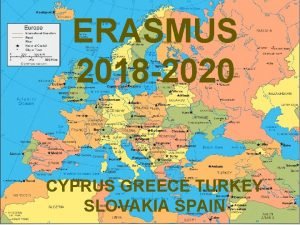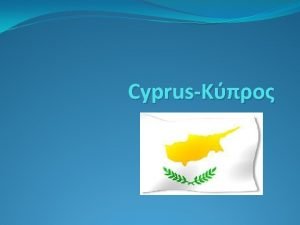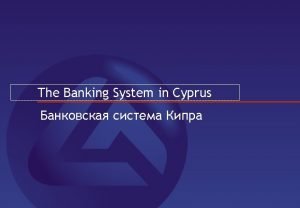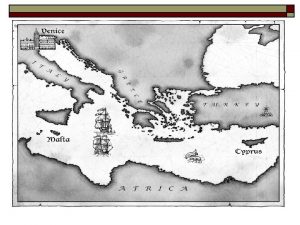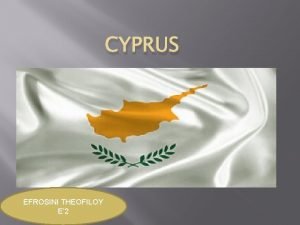CYPRUS Local Government System Introduction II The local












- Slides: 12

CYPRUS


Local Government System Introduction II/ The local participative democracy Historical reminder A) The local referendums I/ The local system B) The public meetings organized by town councils A) The local organization C) The town councils of the young people 1) The devolved administration 1) A participative institution 2) The decentralized administration 2) The modalities of functioning 3) The competences of local authorities B) The territorial actors D) The new technologies of communication and information 1) A national initiative. . . 1) The elected members 2) The civil servants C) Financial means 2). . . Resumed by the local authorities E) A very particular example: the city of Limassol Conclusion

Introduction The geographic context A small country: 731. 000 inhabitants and 9. 251 km² Two communities: greek and turkish The historical and political context Cyprus as an independent state A long-standing conflict still existing between the two communities Cyprus today Cyprus as a member-state of the European Union

Local Government Structure General Principles: Structure: One single level A division by districts Tight links between central government and the local communities

The Decentralized Authorities Municipalities (Local Government Act, 1985) 33 municipalities over 5. 000 inhabitants Rural communities (Local Government Act, 1999) 356 rural communities

Local Authorities’ Responsibilities Some residual competences Major responsibilities regarding the inhabitants municipalities rural communities co-operation is possible

Local Councillors and Local Government Staff The Local Councillors The conditions for being elected The elected members’ obligations The reparations Central government controls: by means of the Home Office Ministry by means of central government field services by the Courts

Local Government Staff: How are they recruited? Appointment submitted to the control of the central government Civil servants can be hired What is the link between the elected members and the administration of local authorities? The officers are subordinated to the mayor Co-ordination is ensured by the Chief Executive

Central Government Field Services Districts Local Authorities Municipalities Rural communities District Commissioners Local Auhtorities’ Staff Local Councils Chief Executive

Local Financial Means Fiscal receipts Central government grants Other receipts Loans Local Finances in 2005 PIB: 13, 5 milliards of Euros Total public spending (TPS) =43, 8% PIB Local public spending = 15, 1% TPS Local public spending = 0, 7% PIB

Conclusion A state still in the process of decentralization Through its European Union-membership Through recent reforms A persistent supervision by central government




